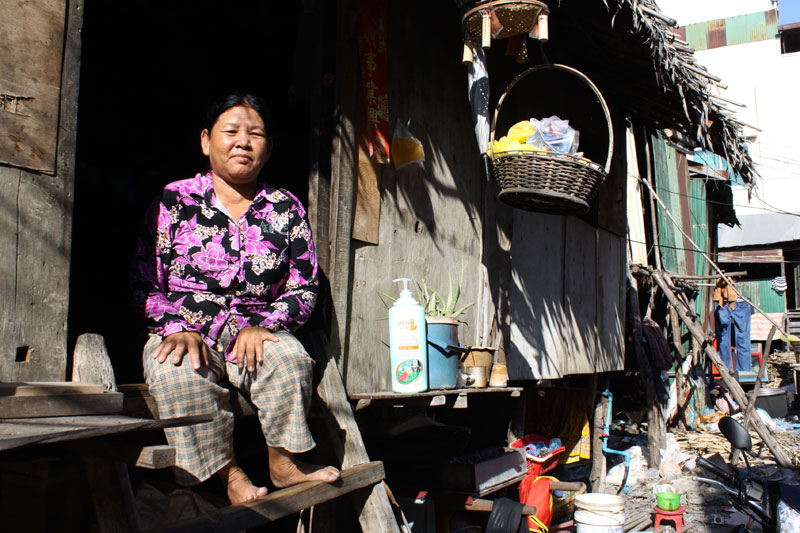When Hay Bunny left her home in Prey Veng province some five years ago to find a job in Phnom Penh, she was not expecting to wind up living in a small tin shack hemmed in by dozens of nearly identical dwellings on a single plot of land.
The 36-year-old freshwater-clam seller shares her rental home in the capital’s Chamkar Mon district with her parents, her husband and her 10-year-old daughter. There are just three toilets, she said, for the 50 families who live on the rubbish-strewn site.

“I don’t like the living conditions here, but I had no work in the province and here I have a chance to give my child an education,” Ms. Bunny said outside her home Thursday.
She said the possibility of being kicked out—she was forced to vacate her previous rental home at the landlord’s whim—weighs heavily on her, as she does not hold a tenancy agreement.
“I worry about this happening again, because it will cause difficulties for us if we have to move, especially if it’s far from my daughter’s school,” she said.
Sahmakum Teang Tnaut (STT), a local urban housing NGO, says renters like Ms. Bunny —mostly migrants from the provinces working low-income jobs and renting small homes in cramped, squalid settlements—live a precarious existence in the face of tenure insecurity, poor health conditions and threats to their safety.
STT on Thursday released a report with the results of a survey of 124 such households occupying properties averaging 13 square meters in size, some sleeping as many as 10 people.
“With migration to Phnom Penh on the rise, it is clear that the need for temporary rental housing is only going to go up in the future,” STT executive director Ee Sarom said in the report.
“The situation is hard for renters, as urgent need for housing means that they typically do not have formal agreements with landlords, who can arbitrarily increase rent from one day to the next,” he said.
STT identified the high prices of water and electricity as a further challenge for renters and called for the government to regulate provision of utilities to the settlements.
The report calls poor urban renters “a forgotten demographic group,” to which there is “little to no reference” in government housing policies.
Key among these policies is Circular 03, a government strategy approved in 2010 to relocate squatters living on state land, and the National Housing Policy, a sub-decree passed by the Council of Ministers in May, which seeks to help low- and middle-income Cambodians buy their own homes.
In its report, STT recommends that the government adopt public housing solutions for impoverished renters and establish construction standards for new rental dwellings.
It also calls on local authorities to enforce landlord-tenant agreements, ensure regular trash collection at the settlements and to monitor utility prices.
So Sok, deputy director-general of the Land Management Ministry’s newly created general department of housing, said the National Housing Policy shows the government’s commitment to improving living conditions for the urban poor.
“The government has the objective to resolve the problem of housing for the poor people and the low-income people,” he said, declining to comment on the out-of-town renters specifically.
Phnom Penh deputy governor Chreang Sophann, however, said that local officials should not intervene in private matters.
“It is down to the agreement between renters and owners,” he said. “If you are not happy, you can find other places to live.”



